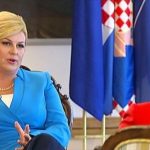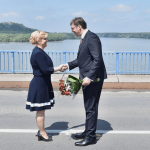The President of Serbia, who will arrive in an official visit to Croatia on Monday, has a chequered personal history.
Serbian President Aleksandar Vučić will arrive in an official two-day visit to Croatia on Monday. The announcement of his arrival several weeks ago created a turmoil in Croatian politics, with usual political divisions being disrupted and no-one seemingly knowing whether to greet it as a move which could improve relations between the two countries or to criticise it as an invitation which humiliates Croatia, since it has extended its welcome to a person whom many consider to be a Greater Serbian nationalist.
Although Vučić’s more recent statements have much to do with the resentment which many in Croatia feel towards him, his more distant personal history is even more controversial. During his political career, Vučić has moved from being an extremist nationalist to peace-loving reconciliation advocate and back. His frequent changes of opinion often confuse his opponents, who are not sure whom they are really dealing with.
Vučić was born in 1970 in Belgrade, where he graduated from the Faculty of Law. In 1993, he became a member of the extremist nationalist Serbian Radical Party led by infamous Vojislav Šešelj, and the same year he was elected as a deputy in the Serbian Parliament. Two years later, he was already the secretary general of the party, known by its aggressive rhetoric towards non-Serbs.
In March 1995, Vučić visited Glina, a town in a then occupied part of Croatia, where he gave one of his most infamous speeches. “Serbian Krajina and Glina will never return to Croatia! If the Serbian Radicals win the elections, you will live in Greater Serbia, a united Serbian state, and there will be no deviations from this goal,” said Vučić in his speech. Despite his threats, several months later, after the Operation Storm, both Glina and the whole Krajina were back under the Croatian control.
With the wars in Croatia and Bosnia and Herzegovina entering the decisive phase, it seems that 1995 was a particularly active year for Vučić, as far as giving warmongering speeches is concerned. That same year, Vučić gave a speech in the Serbian Parliament, in which he reacted to NATO airstrikes against Bosnian Serb positions. “If you kill one Serb, we will kill a hundred Muslims. So, just keep bombarding. Let us see if the international community or anybody else can hit Serbian positions, whether they can behave like this towards the Serbian people,” threatened Vučić.
During his visit to Sarajevo in 2015, Vučić, who was Serbian Prime Minister at the time, said that his statement was given in a different context. “I have certainly said many other things that I thought were good at the time, but which I would not repeat today. Even now, I make mistakes. I cannot stand people who are infallible,” said Vučić.
In March 1998, after his party entered the ruling coalition with then Serbian President Slobodan Milošević, he was appointed as Information Minister. During his term of office, journalists who were critical of the ruling regime were punished with hefty fines and banned from writing. This caused numerous media outlets to be closed down.
Even many years after the end of the war, Vučić remained faithful to his Greater Serbian roots. For example, in 2000, he gave a speech in which he said that the Ustashas had occupied the Serbian territories. “Karlobag, Ogulin, Karlovac and Virovitica are Serb lands,” said Vučić. All four of these towns are deep in the Croatian territory, but they have an important role in the Greater Serbian ideology since they were supposed to represent the western frontier of the “Serbian lands.”
In October 2004, Vučić ran for Mayor of Belgrade. He entered the second round but was defeated by Nenad Bogdanović, a candidate of much more moderate Democratic Party.
In September 2008, after a breakdown of relations between Serbian Radical Party leaders Vojislav Šešelj and Tomislav Nikolić, Vučić resigned from all his party duties. In October, he and Nikolić founded a new party, the Serbian Progressive Party (SNS), with Nikolić as party president and Vučić as deputy president. After the split, Vučić changed his positions and suddenly started advocating more moderate policies. He now supports Serbia’s entry into the European Union and likes to present himself as a great proponent of peace in relations with the neighbouring countries.
In May 2012, SNS formed a new Serbian government together with the Serbian Socialist Party, whose leader Ivica Dačić became the Prime Minister. Although Vučić was just Deputy Prime Minister and Defence Minister, in reality, he became the most powerful politician in Serbia, which is a position which he has kept until this day.
After early parliamentary elections in March 2014, Vučić formed a new coalition government and was elected as the Prime Minister, formally confirming him as the most powerful man in Serbia.
In 2017, Vučić decided to run for president, nominating himself as his party’s candidate instead of President Tomislav Nikolić, who was expected to run for the second term. Vučić won easily and in May became the President of Serbia. Although the post is mainly ceremonial, as president of by far the largest political party in Serbia, Vučić is undoubtedly the man who makes all the critical decision in the country.
Vučić seems split between trying to present himself as a modern, reasonable politician to the international community, at the same time occasionally playing a much more radical role for his voters, often trying to present himself as a victim of other people’s scheming and having his associates say things he cannot publicly say. He is surprisingly successful in this, with many of the most prominent international politicians praising him and apparently believing his statements about being pro-European. At the same time, he is trying to remain close to Russia and China as well, knowing well that, by not putting all the eggs in one basket, he might be able to extract as many concessions as possible from both the West and the East.
Within Serbia, he is more popular than any politician in the last 20 years, with his party regularly winning more than 50 percent of votes in parliamentary elections, which are in Serbia almost an annual occurrence. He has a habit of calling elections even when there is no need for them, which enables him to lead a permanent pre-election campaign. Still, with the resolution of the Kosovo issue getting closer, which will ultimately force Serbia to at least accept, if not outright recognise, its independence, which will undoubtedly be a substantial blow to the Serbian pride and possibly to his currently unmatched popularity, Vučić is not as strong as he was several years ago. His first test in new circumstances will be local elections for the Belgrade city administration next month, where his party is favourite, although the victory is not guaranteed. To increase its chances of winning, Vučić even ignored a custom that presidents should stop being involved in party politics, so his party’s candidate list will bear his name.
Regarding relations with Croatia, Vučić alternates between giving peaceful statements about the future and calling on the development of good-neighbourly relations on the one hand and accusing Croatia of various crimes allegedly committed against the Serbs, during the Second World War and in more recent times, on the other hand. A significant improvement in a relationship probably will not be achieved at this time, despite all the efforts being invested by the international community, which is believed to stand behind the somewhat unexpectedly sent invitation to Vučić to visit Zagreb at this particular time.
However, Vučić has every reason to be satisfied with the current state of affairs. He will come to Zagreb and talk about his willingness to improve the relations and, at the same time, he will be able to witness the conflict which his visit has created between the Croatian President and the government, who have started to publicly undermine each other, with the Prime Minister being against the visit and saying that he would discuss the controversial issue of the war reparations with Vučić, while the President at the same time says that this is not a topic for discussion. Even if nothing else happens, Vučić can consider his mission to be accomplished.










